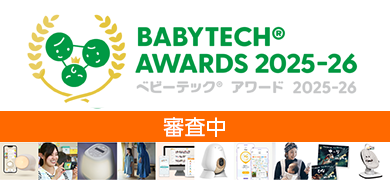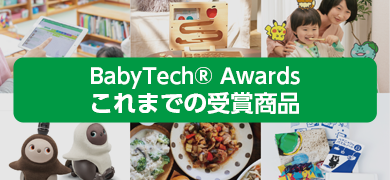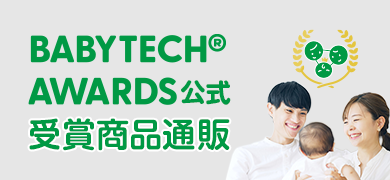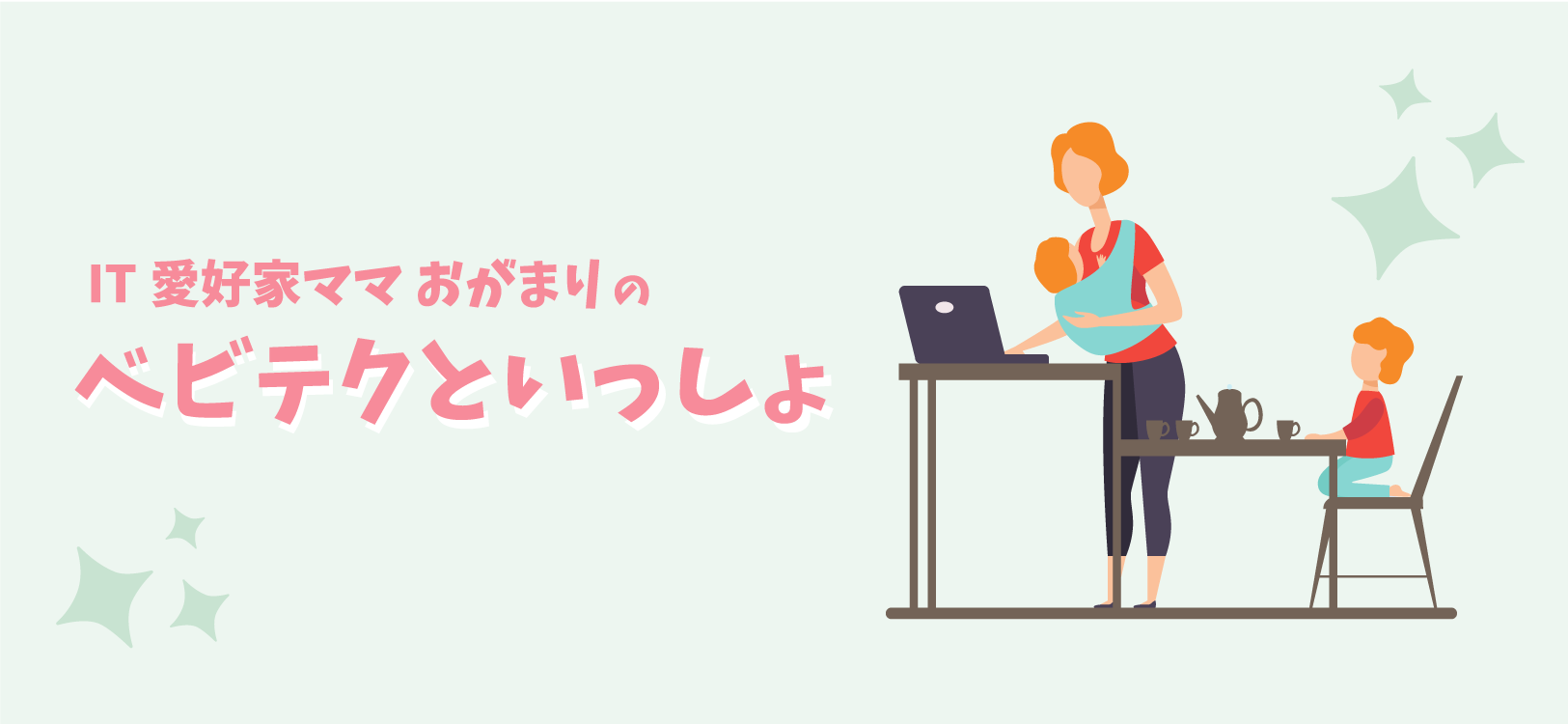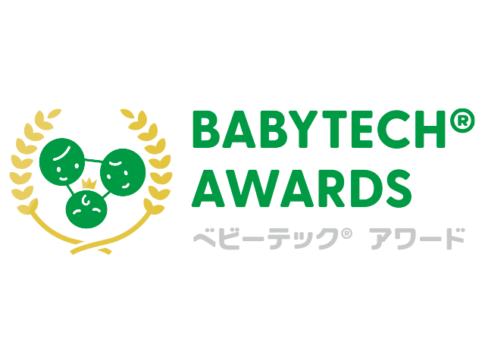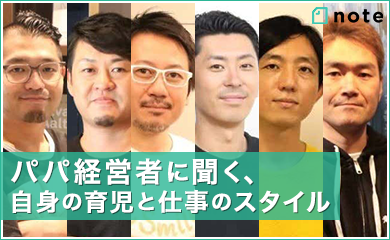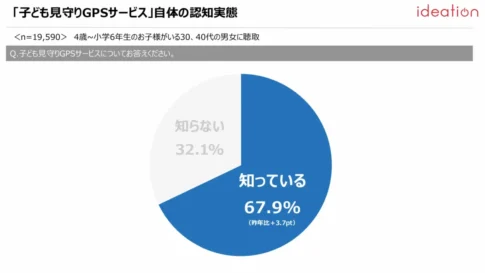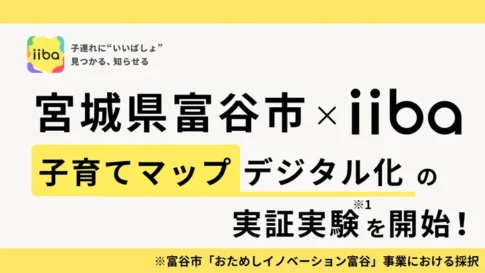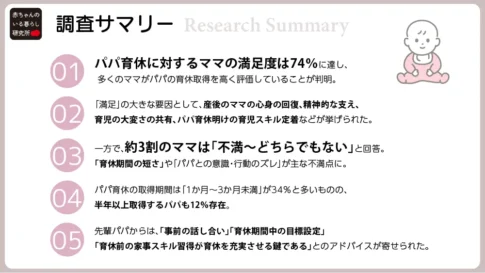~ Parents' Views on Education Separate, How to Deal with Children and AI~.
- The following is content from the press release -
(HQ: Chiyoda-ku, Tokyo; CEO: Kei Kawashima), provider of the "Think!Think!" app and the "Wonderbox" STEAM learning materials, conducted a survey of parents with children aged 4 to 10 on their attitudes toward generative AI ( The company conducted a survey of parents with children between the ages of 4 and 10 on their attitudes toward generative AI (e.g., ChatGPT).
The survey results showed that the largest number of parents believe that generative AI is useful but needs to be used with caution,About one in three respondents expressed a positive interest, saying they "expect new possibilities to open up" and "want to know more about how it can be used.indicated that they are not sure about it yet and cannot make a decision. On the other hand, many said they could not make a decision because they were not sure yet, or were concerned that it might have a negative impact on their children's learning and growth,The reality that there is a wide range of distance between parents and generated AIwas revealed.
In addition, the homeDifferences in the degree of use of digital teaching materials and educational policiesWe also found that there were differences in trends in impressions of the generative AI depending on the
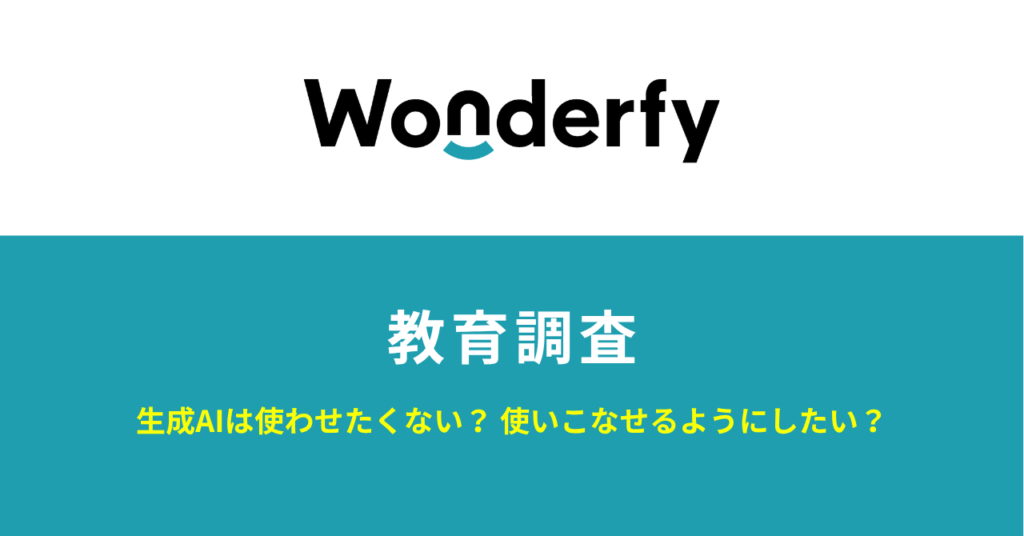
Survey Highlights
- Convenient but requires caution" is the most common response, with parents' true feelings mixed with expectations and concerns.
- The more frequently families use digital materials, the more positive their interest in generative AI.
- Differential distance from AI depending on the ability to nurture - Educational views influence impressions.
Impression of generative AI, "Useful but needs attention" is the most common (42.7%)
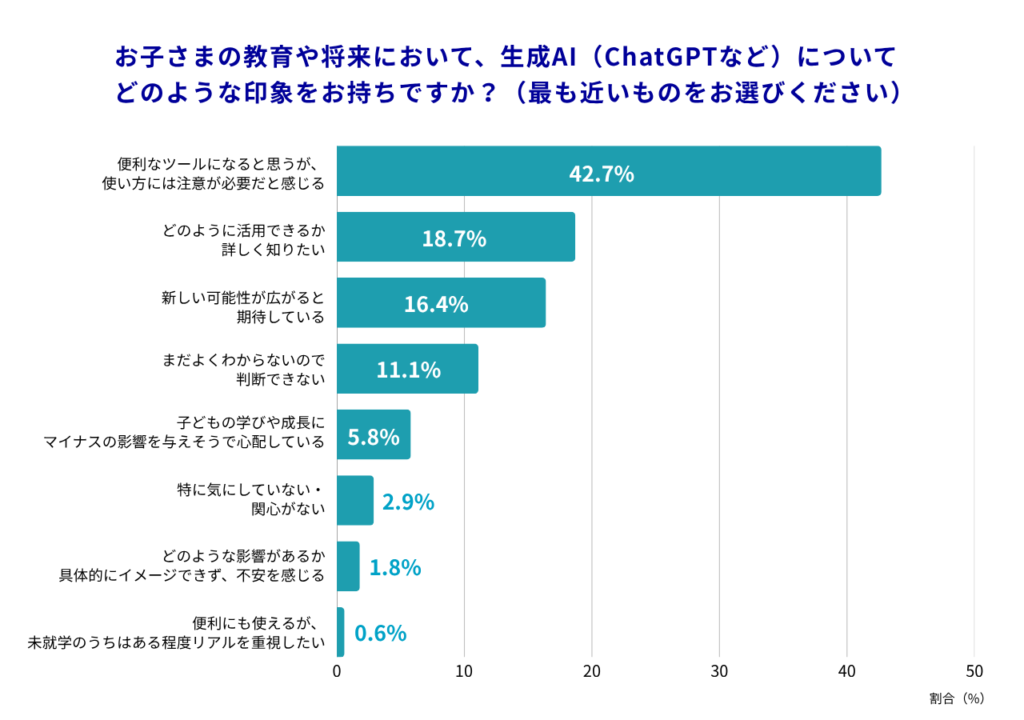
The survey asked parents about their impressions of generative AI (e.g., ChatGPT).
As a result, the most common response was "I think it will be a useful tool, but I feel it needs to be used with caution," accounting for 42.7% of the responses.
Also,About 35.1% of parents answered "I am looking forward to new possibilities" and "I want to know more about how it can be used.A certain number of respondents expressed a positive interest in generative AI.
On the other hand, "I am concerned that it may have a negative impact on my child's learning and growth," and "I feel uneasy because I cannot visualize exactly what kind of impact it will have.7.6% of respondents were also reluctantThe results of the survey revealed that there is a wide range of perceptions among the parents.
Families that use digital materials more often are more positive about generative AI
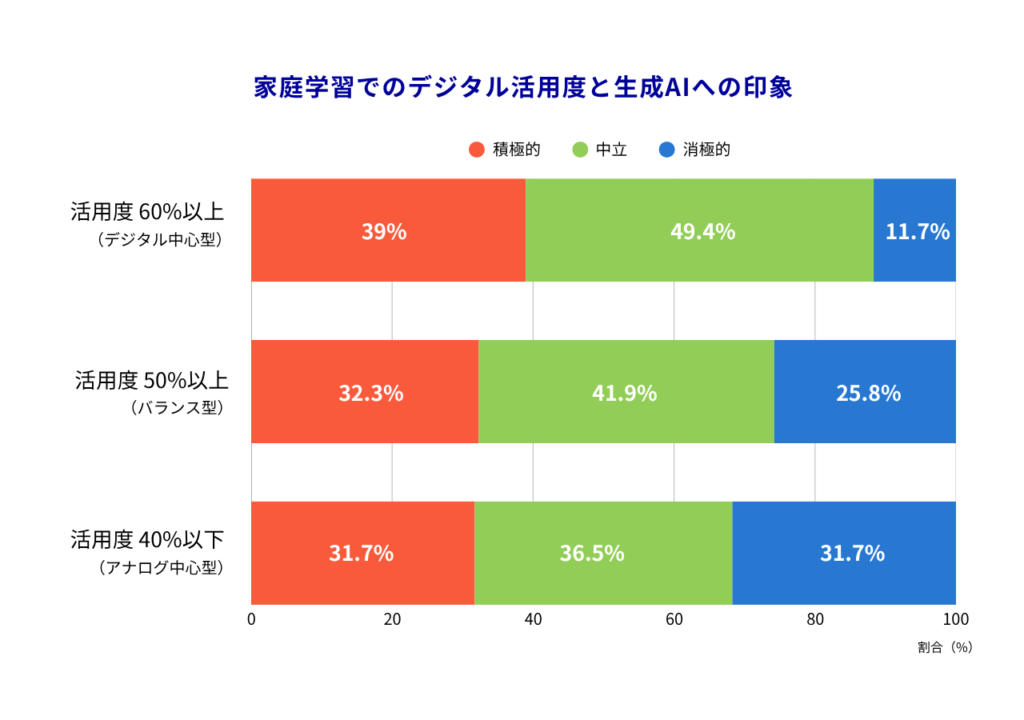
When we looked at the relationship between the level of use of digital materials in home learning and impressions of generative AI, we found that families that actively use digital materials tend to have a more positive attitude toward generative AI.
In this release, the analysis is based on responses to impressions of generative AI, organized into three categories: "positive," "neutral," and "negative.
Among "digital-centric" families, where more than 60% of home learning is done with digital materials, about 39.0% had a "positive" impression of generative AI, and only 11.7% were "negative" about it.
On the other hand, "analog-centered" families, where 40% or less use digital teaching materials, were both "positive" and "negative," at about the same 31.7%, indicating a cautious attitude toward generative AI.
And among "balanced" families, who utilize half digital and half analog, it was difficult to find a clear trend, and there were indications of split judgments.
*The percentage of home study using digital learning materials was based on a question asking "How much of your home study time is spent using digital learning materials (tablets, smartphones, etc.)? The results were classified into three categories: "digital-centric (60% or more)," "balanced (50%)," and "analog-centric (40% or less).
*Categorization of impressions of the generated AI is organized based on the responses as follows:
Proactive: "I am looking forward to new possibilities" and "I want to know more about how it can be used.
Neutral: "I think it will be a useful tool, but we need to be careful how we use it." "It can be useful, but I want to focus on realism to some extent while it is still in preschool."
Negative: "I am concerned that it may have a negative impact on my child's learning and growth," "I cannot visualize exactly how it will affect my child and I feel uneasy," "I am not sure yet and cannot make a decision," "I am not particularly concerned or interested.
Parents' distance from generative AI depends on their view of education
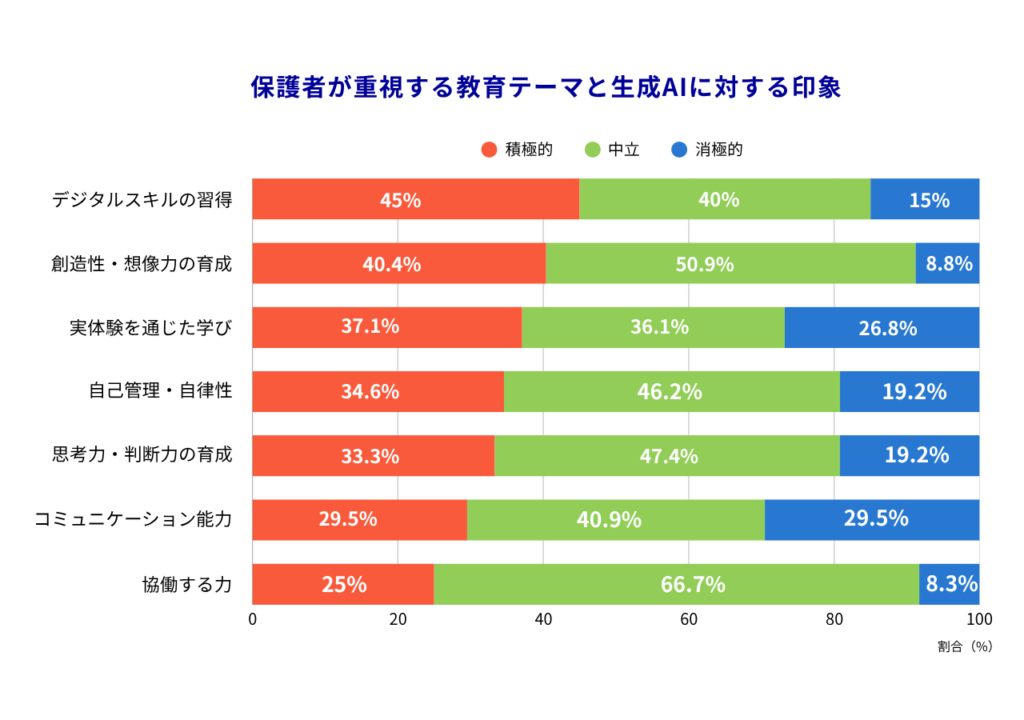
Parents' impressions of generative AI were tabulated for each of the educational themes that were important to them, and it was found that differences in their views of education tended to influence their distance from generative AI.
For example, about 40.4% of the parents who emphasized "fostering creativity and imagination" showed positive interest (expectations and want to know more about it) in generative AI, while only 8.81 TP6T were reluctant to answer such questions as "anxious and unable to judge".
On the other hand, families that place more importance on "communication skills" are split between positive and negative responses at 29.5% each, indicating that opinions are divided.
Thus, there were differences in how parents perceived the generated AI, depending on what kind of skills they wanted to develop in their children.
Comments from the WonderPhi Research Team
There is an ongoing debate in society regarding the use and regulation of generative AI, with parents expressing a mixture of anxiety that they do not want their children to use it yet and hope that they will be able to use it in the future.
The survey also revealed differences in impressions of generative AI depending on the use of digital educational materials at home and the parents' view of education. We feel that each family's view of education, in terms of what kind of abilities they want to nurture in their children, is reflected in the way they deal with generative AI.
What is important for children who will live in the future is the ability to accept the existence of generative AI and utilize it proactively. To do so, they need sensitivity and the ability to think for themselves and to make decisions in their own way. We believe that this can only be nurtured through both digital and analog experiences.
WonderFi will continue to create "intellectual excitement" by combining the digital and analog worlds, keeping an eye on the changing times.
Survey Summary
- Survey target: Parents with children between the ages of 4 and 10 who have used our correspondence course "Wonder Box" or requested information materials.
- Survey method: Online survey (form entry)
- Survey period: May 12, 2025 - May 14, 2025
- Number of respondents: 171
- Implementing entity: Wonderfi Inc.
*Percentages in this release are rounded to the first decimal place, so the total may not equal 100%.
About "Wonder Box," a STEAM communication resource for learning while playing

Wonder Box, launched in April 2020, is a distance learning service in the STEAM domain* that fosters children's "ability to think, creativity, and motivation" at home through a combination of digital and analog methods (target age: 4-10 years old). The service provides playful educational materials such as programming, art, board games, and puzzles to cultivate the basic skills in the STEAM educational domain that will be required in the coming age. It has received numerous awards, including the Kids Design Award, Good Design Award, and Parenting Award. It has received high acclaim for its design and quality as educational materials.
(*)STEAM education is an acronym for Science, Technology, Engineering, Art, and Mathematics, and refers to the educational domain of science and art. It is a concept that has been advocated in educational policy in Europe and the United States, and has recently been emphasized in educational reform in Japan.
Wonder Box Official HP
https://box.wonderlabedu.com
Think Think Think, an educational application that fosters thinking skills
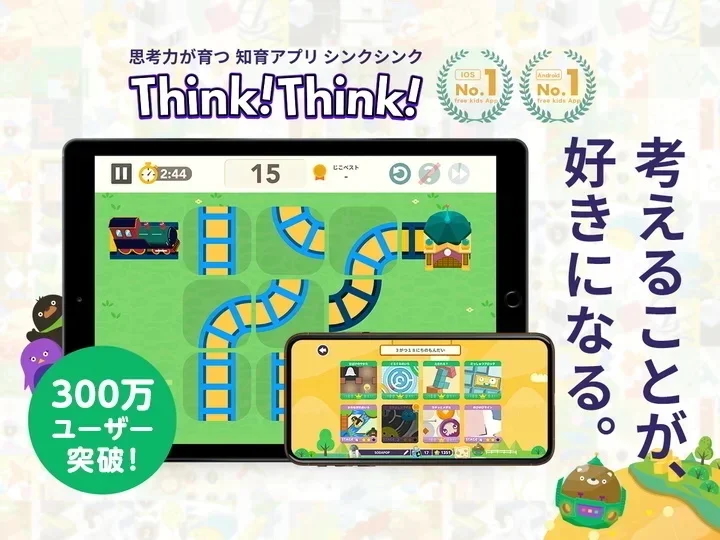
In April 2024, the total number of users exceeded 3 million, and the app is being used by children in 150 countries around the world. The app has been used by children in 150 countries around the world.
Think Think is an educational application based on WonderPhi's mission "to bring out the 'intellectual excitement' that children around the world inherently possess. It has received a great deal of support as a tool to support the educational policy of families, especially those who place importance on creativity and independence.
Think Think Official HP
https://think.wonderfy.inc
About WonderPhi Inc.

WonderPhi is a company that develops and operates educational materials and content to bring out the "intellectual excitement" in children around the world, including Wonderbox, a new correspondence course for STEAM education, and Think Think Think, an application that has been enjoyed by 3 million children in 150 countries. The company also operates "Think Think Think," an application that nurtures thinking skills and is enjoyed by 3 million children in 150 countries. The company is a pioneer in STEAM/STEM and thinking skills educational materials, having produced and supervised many questions for international math competitions.
In November 2018, the company won the top prize at the Japan preliminary round of the Global EdTech Startups Awards (GESA), the world's largest education venture competition (*1). We have also exhibited and spoken at SXSW EDU and other global educational forums as a representative of Japan.
In February 2020, we announced a new distance learning program in the STEAM education area, Wonderbox (*2).
On December 14, 2022, the company name was changed from WonderLab to WonderPhi Inc.(*3).
Wonderfi Corporation Official HP
https://wonderfy.inc/
(*1) https://prtimes.jp/main/html/rd/p/000000028.000012970.html
(*2) https://prtimes.jp/main/html/rd/p/000000043.000012970.html
(*3) https://prtimes.jp/main/html/rd/p/000000091.000012970.html

